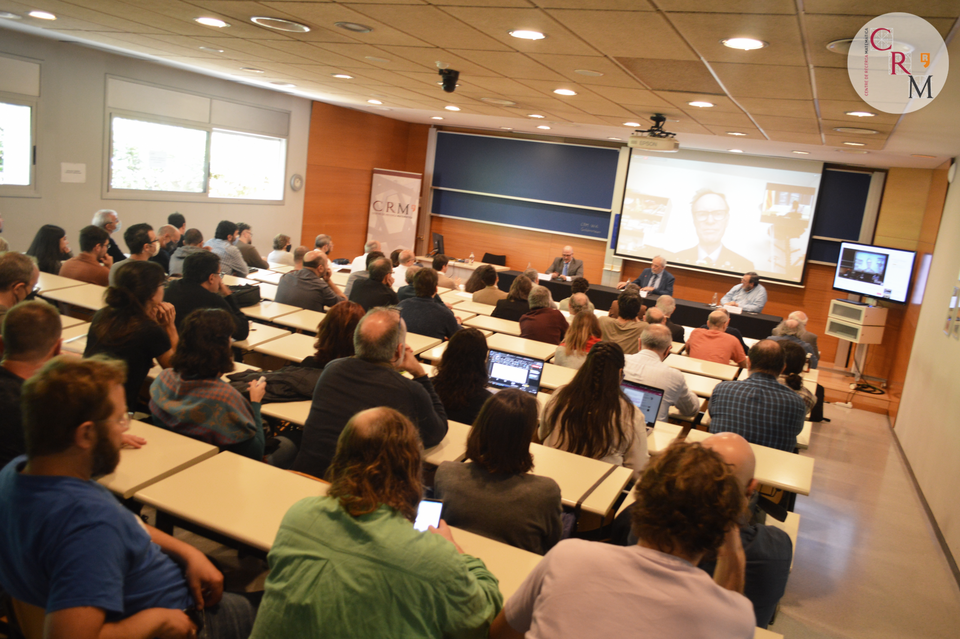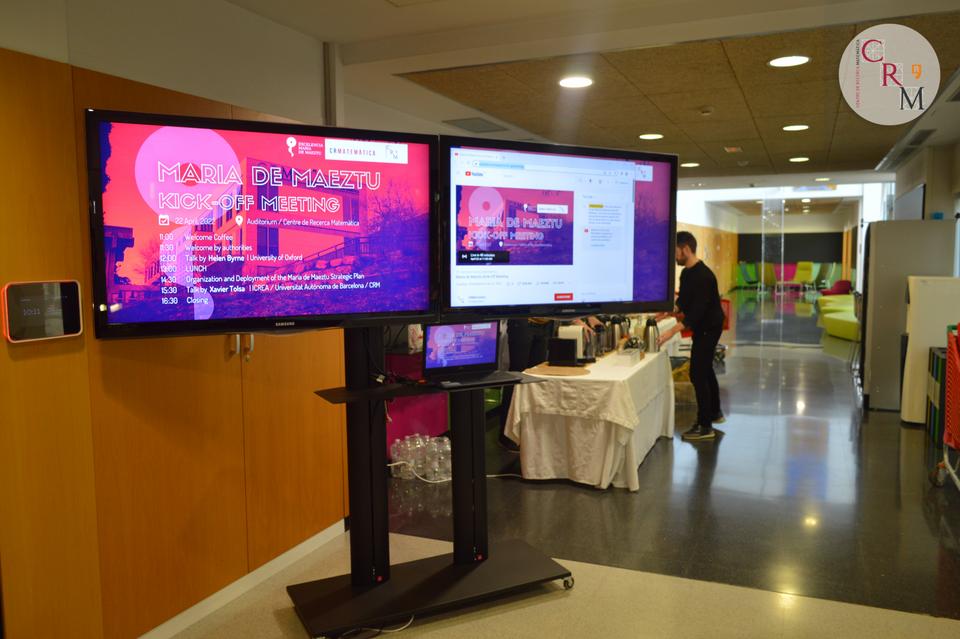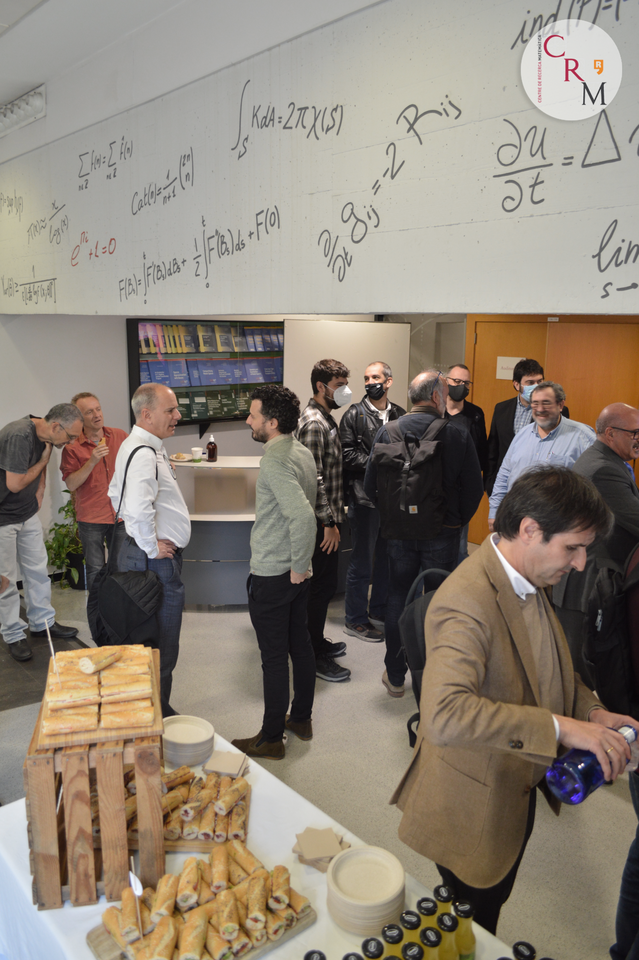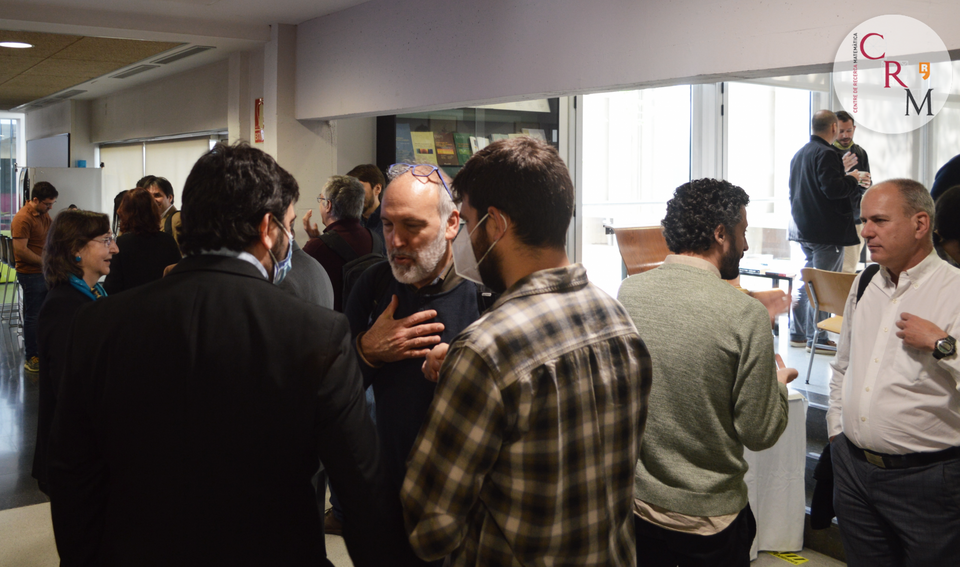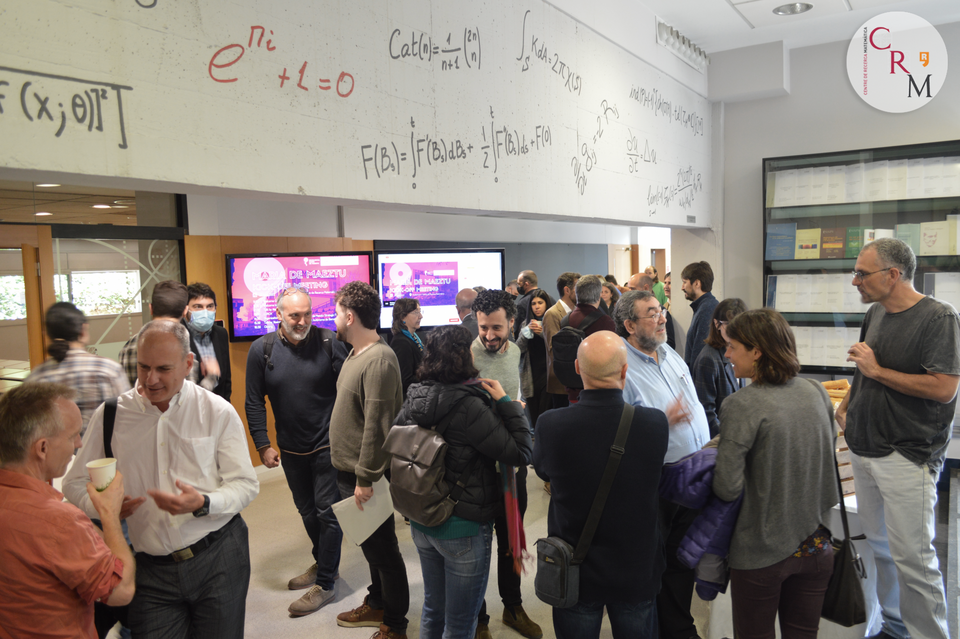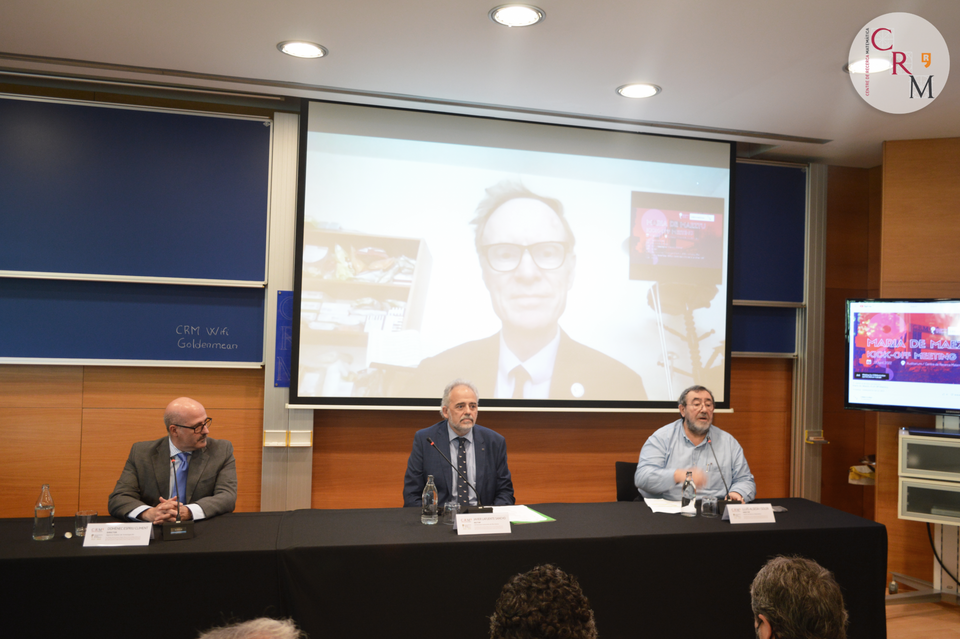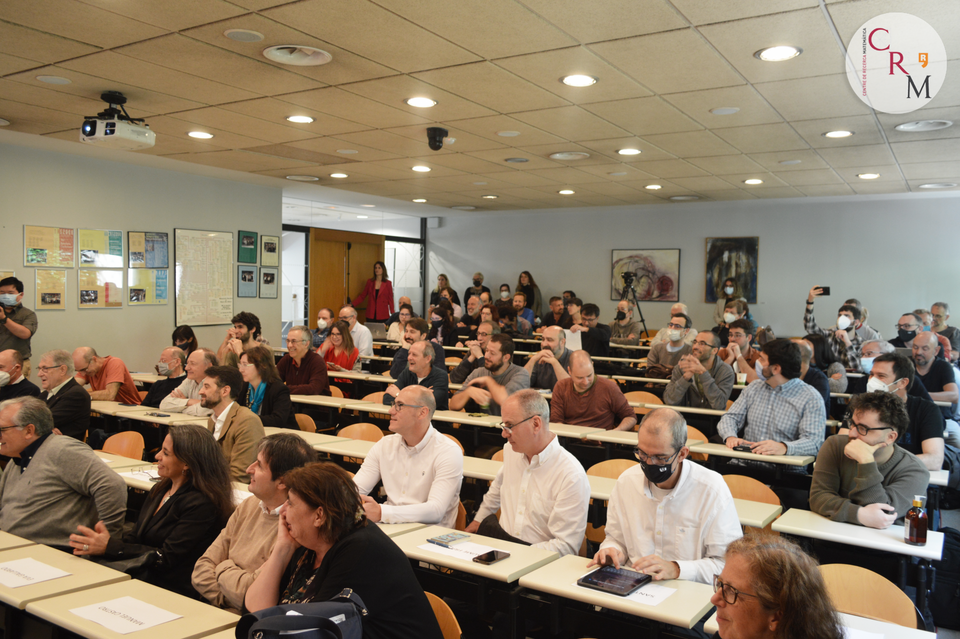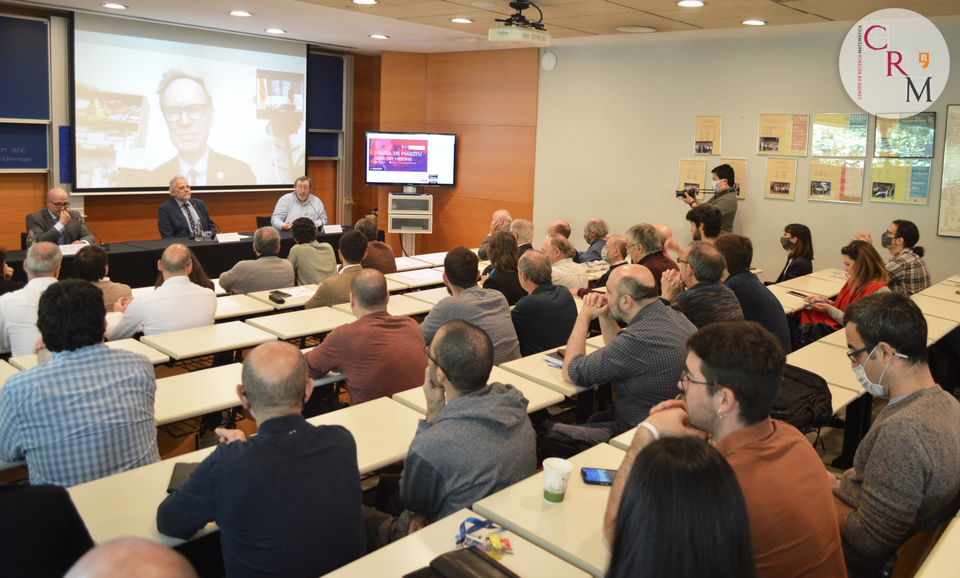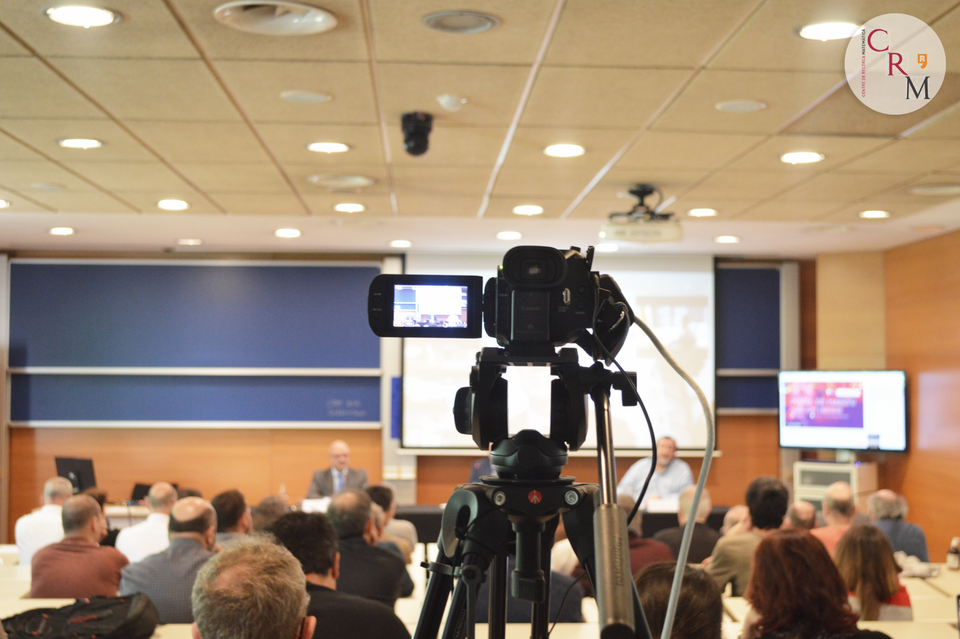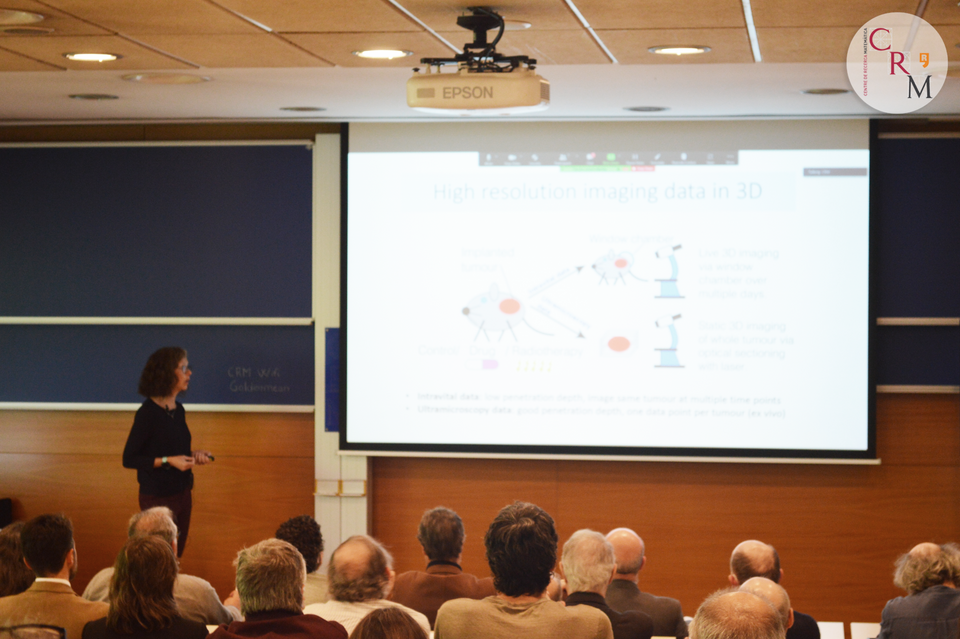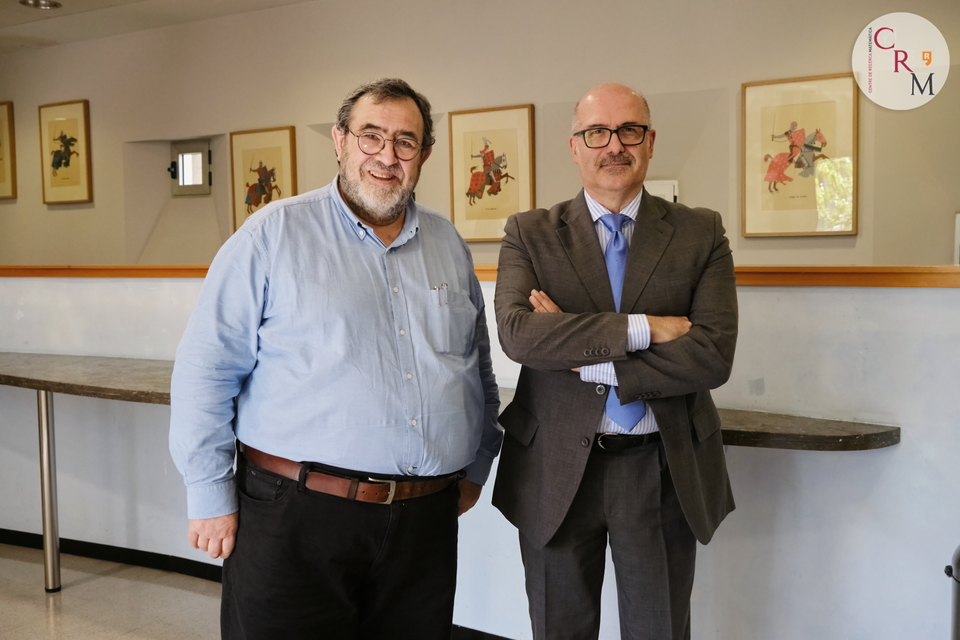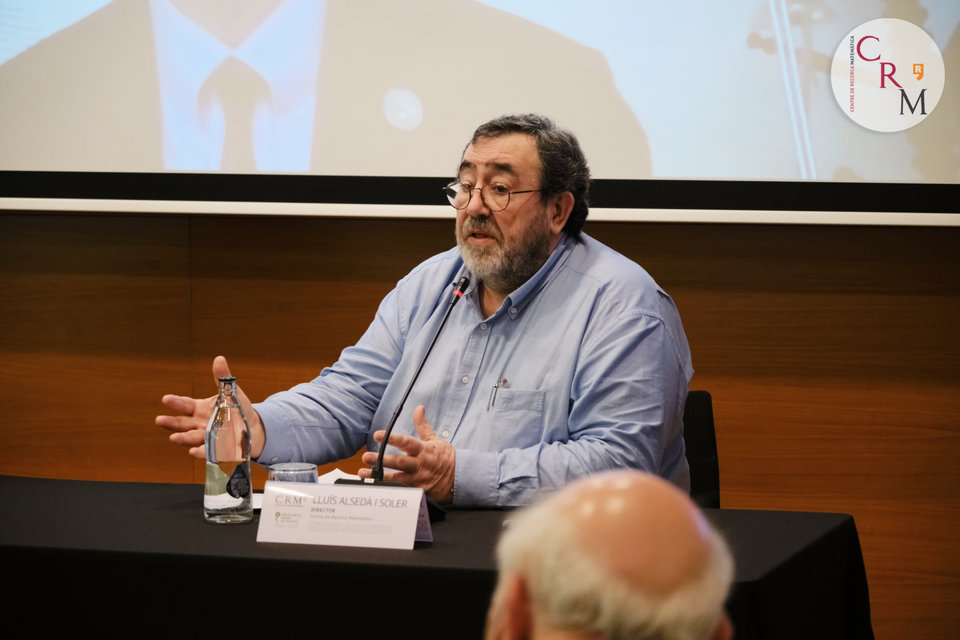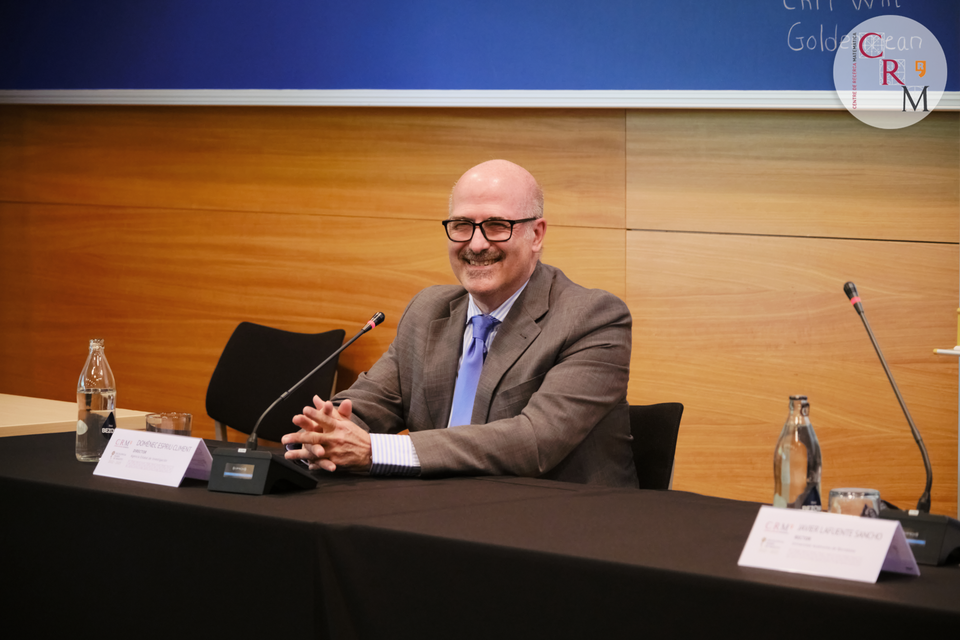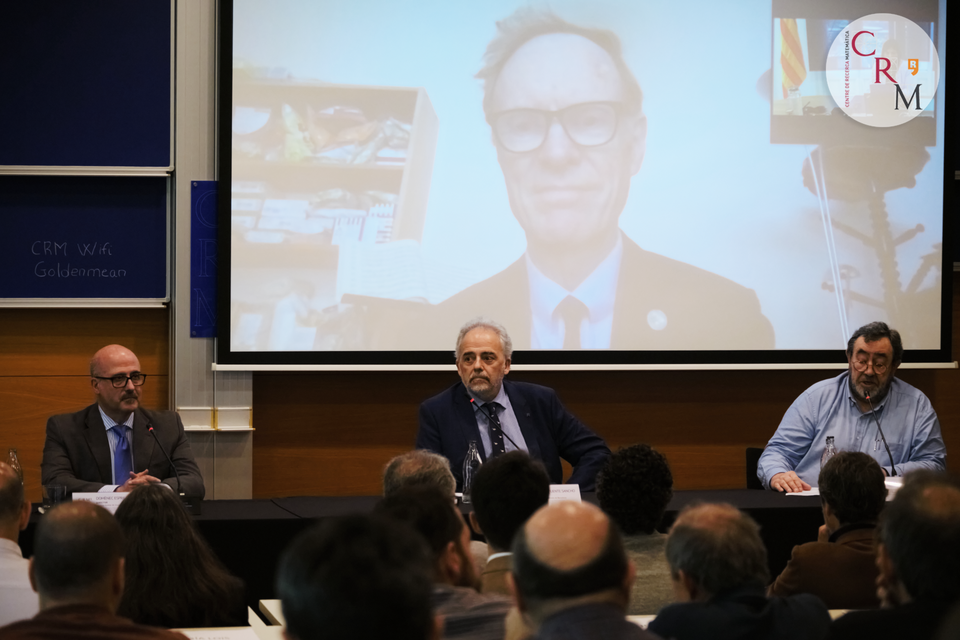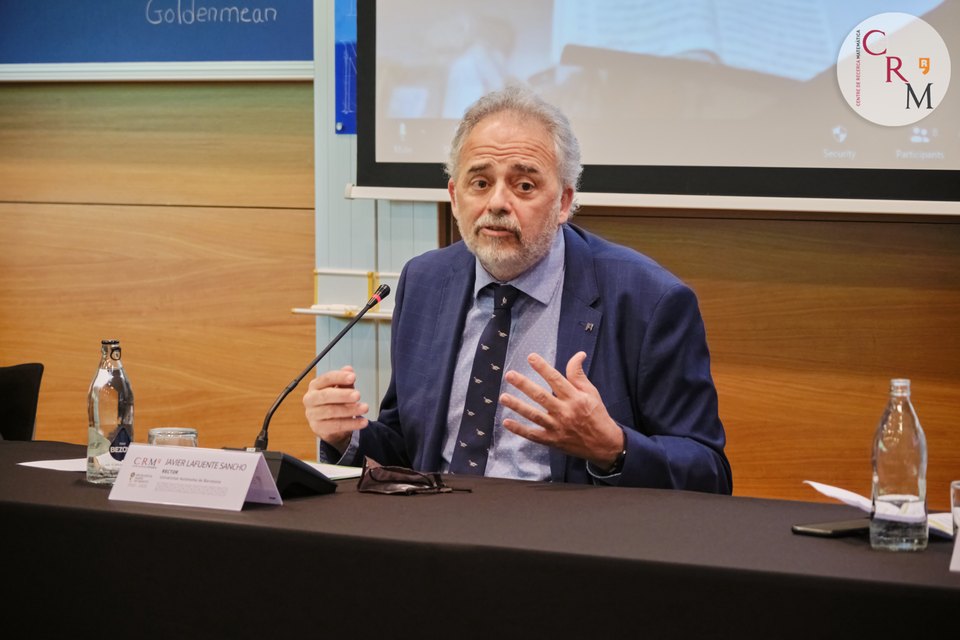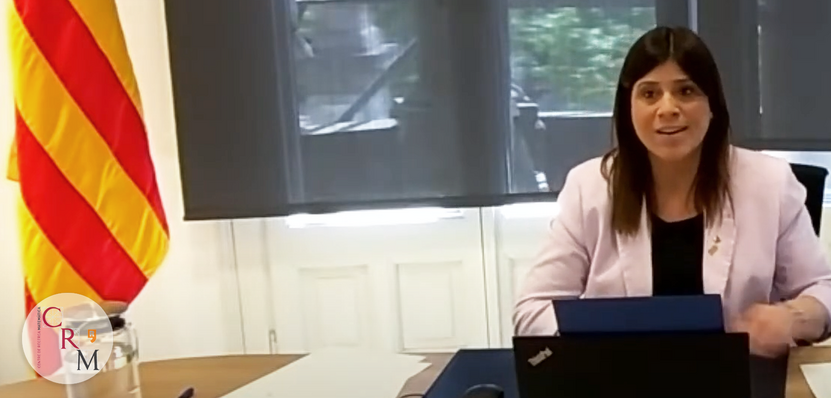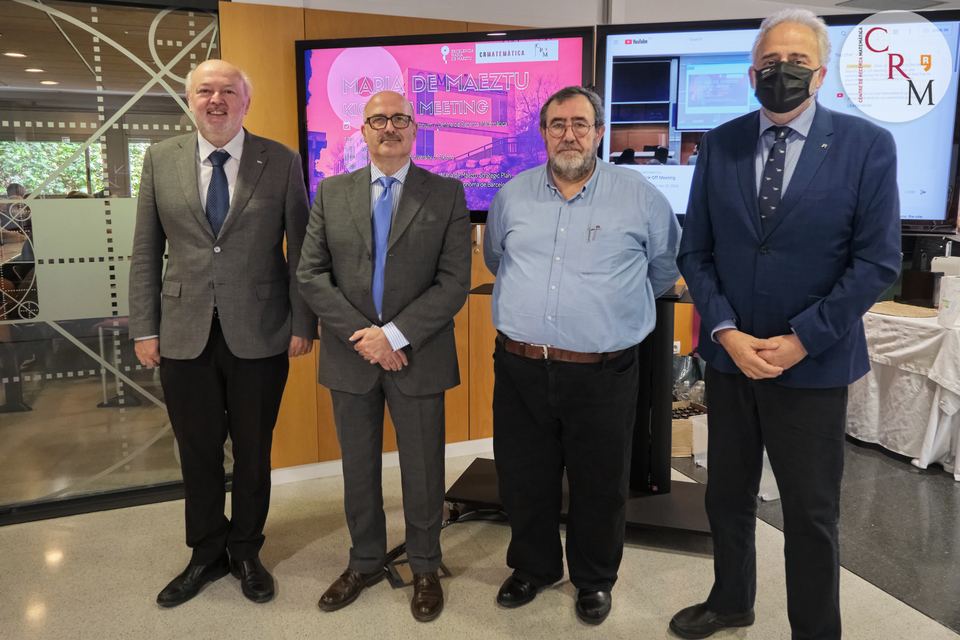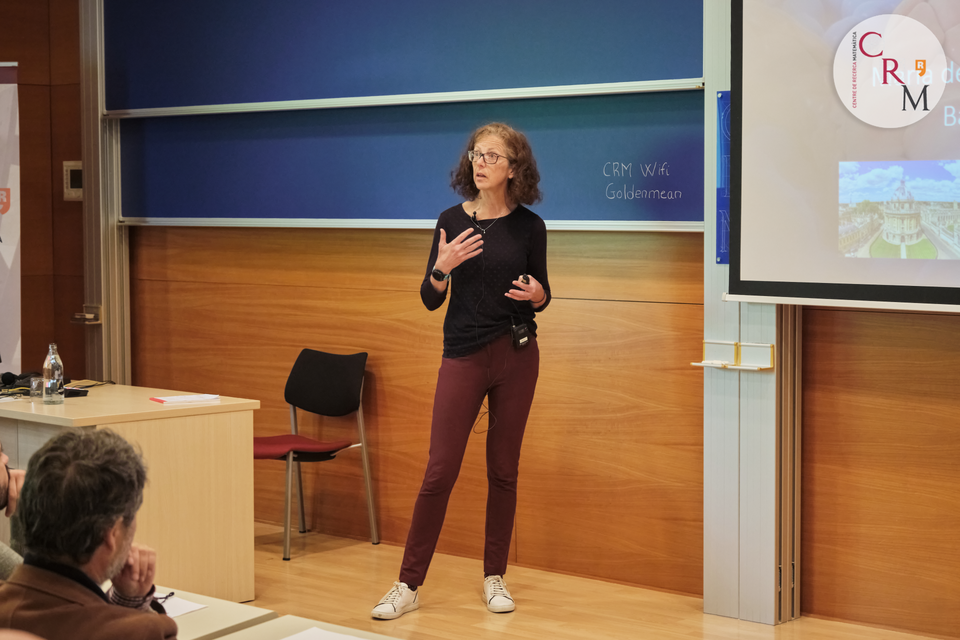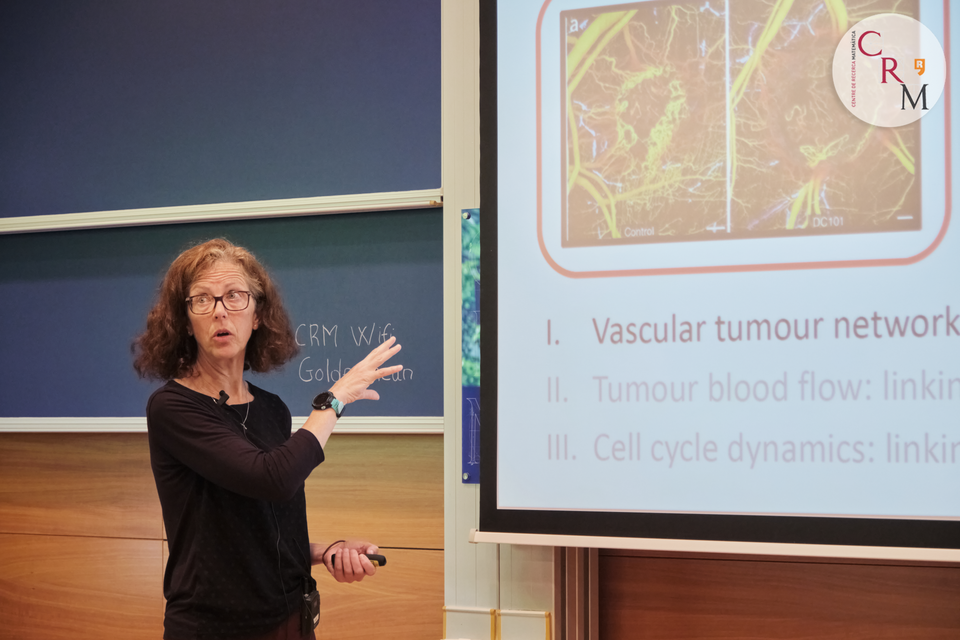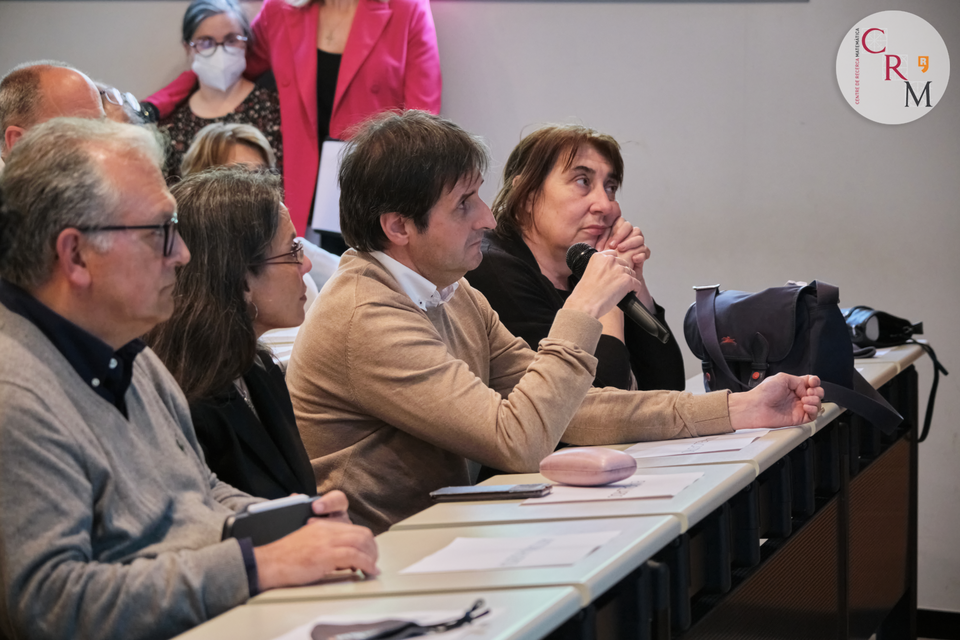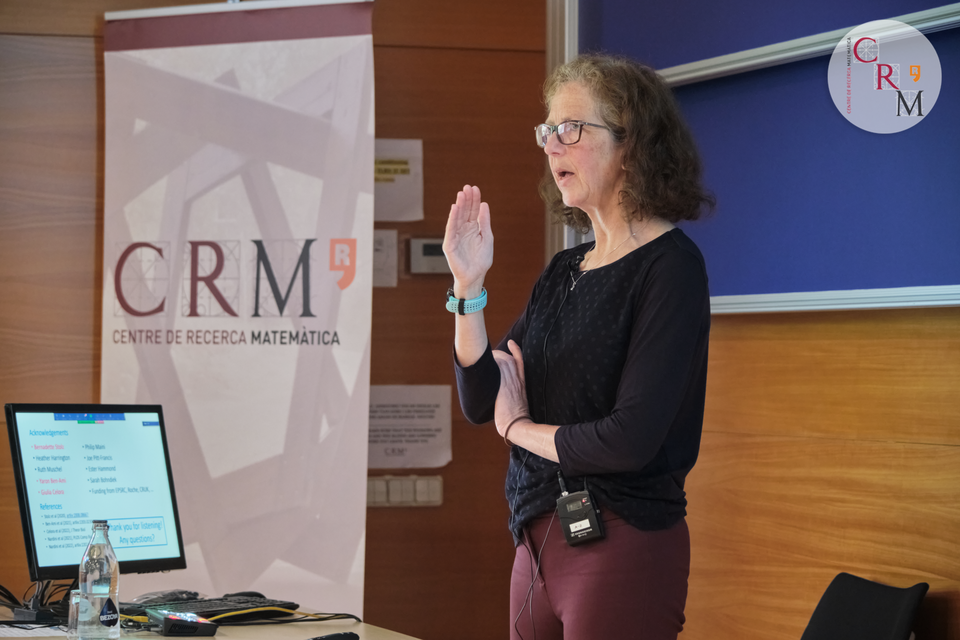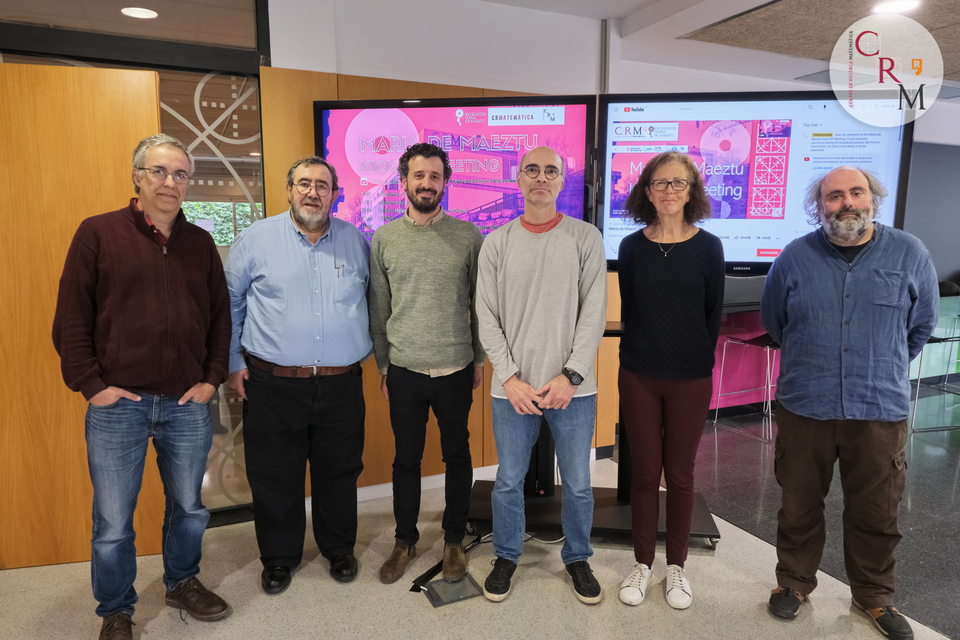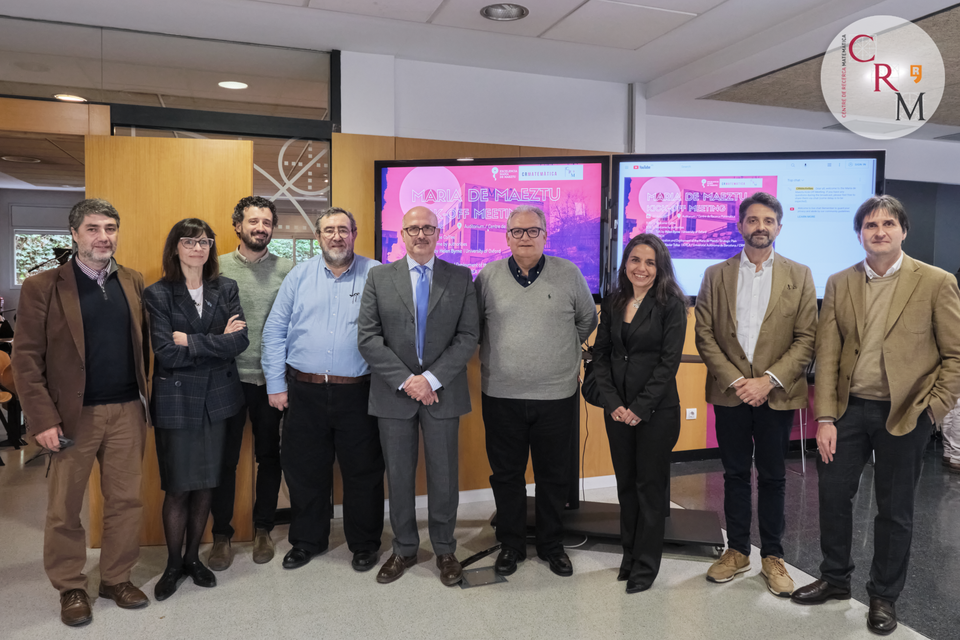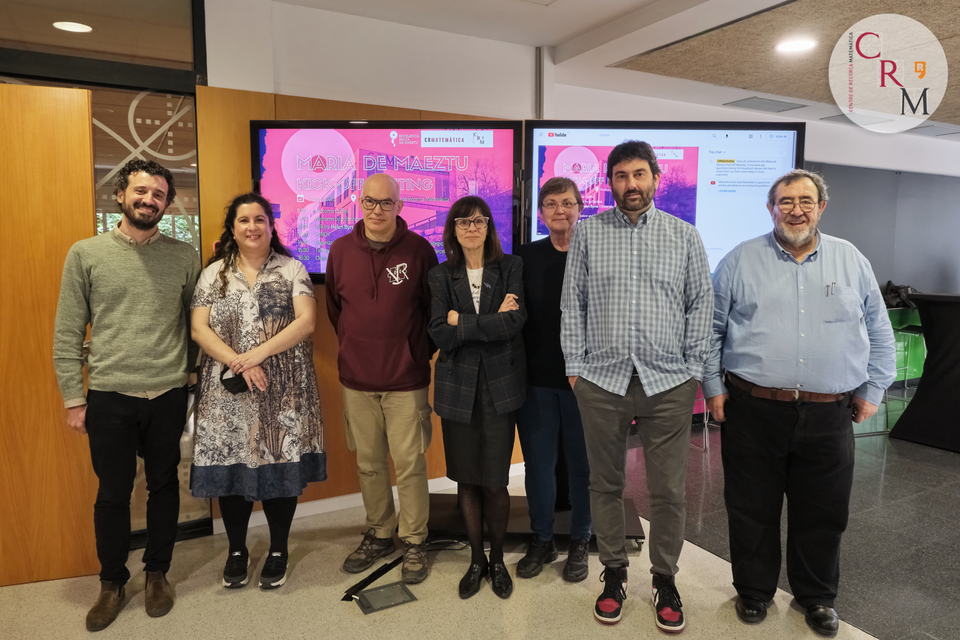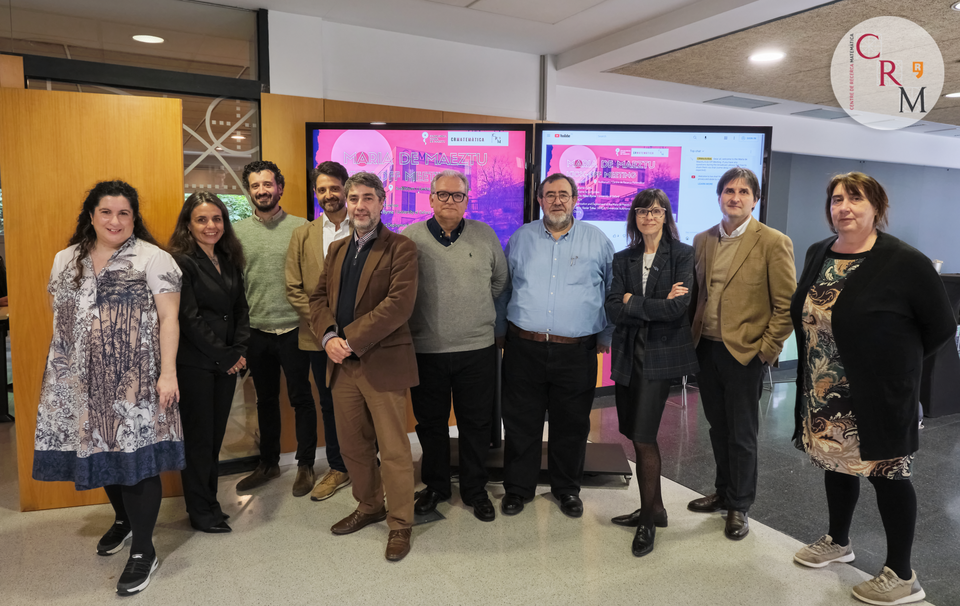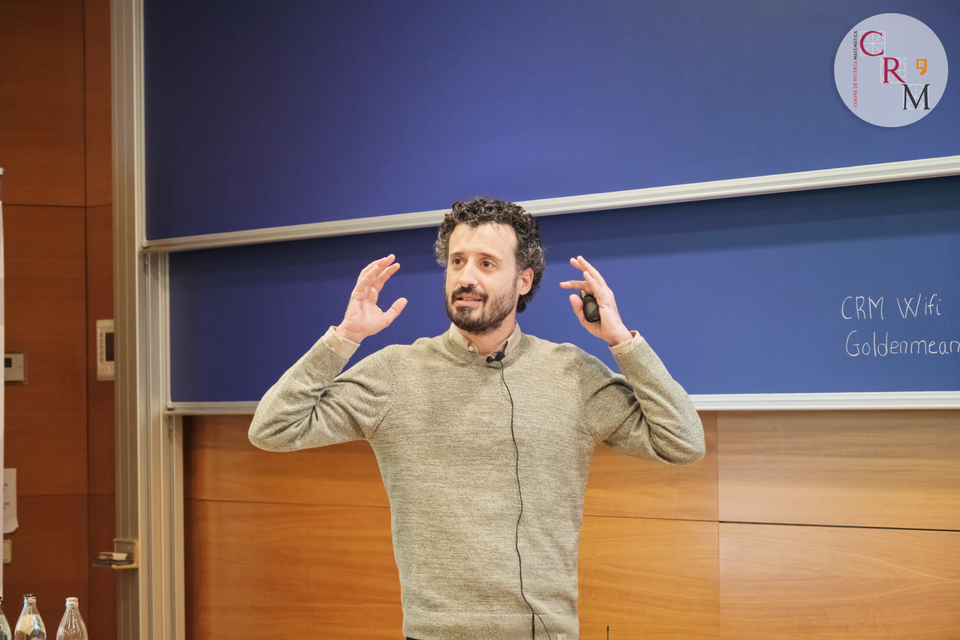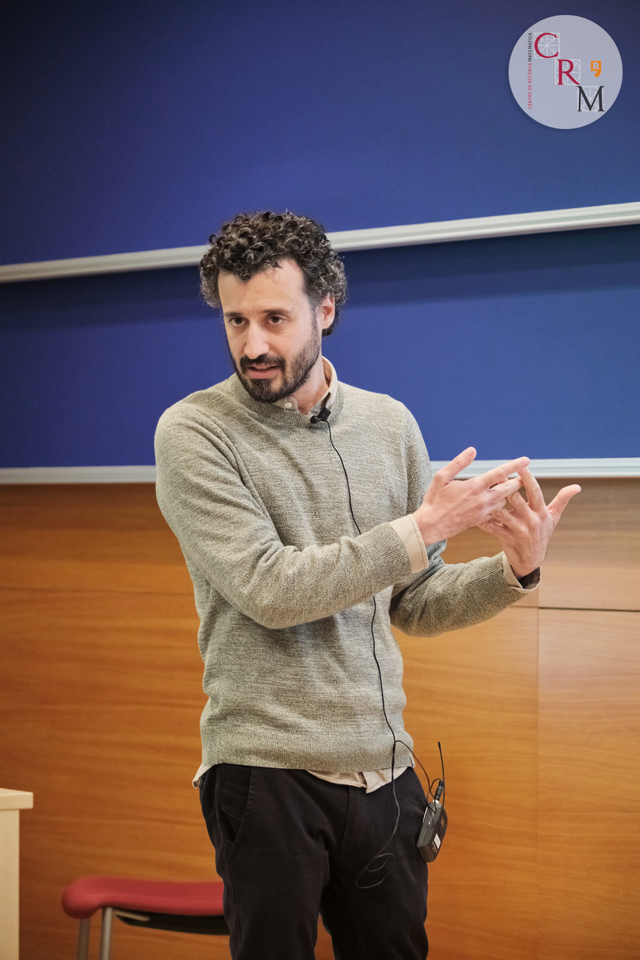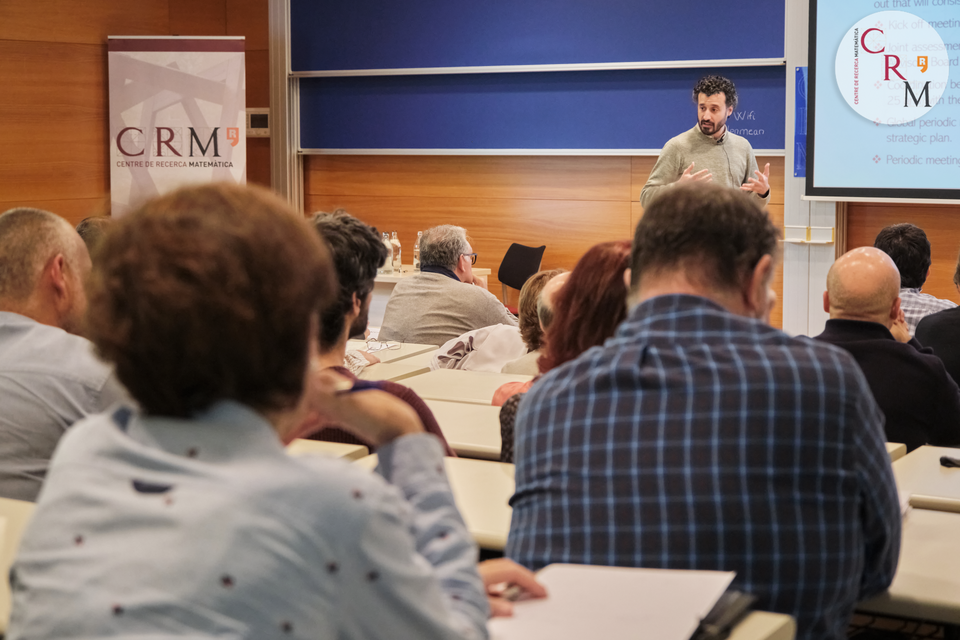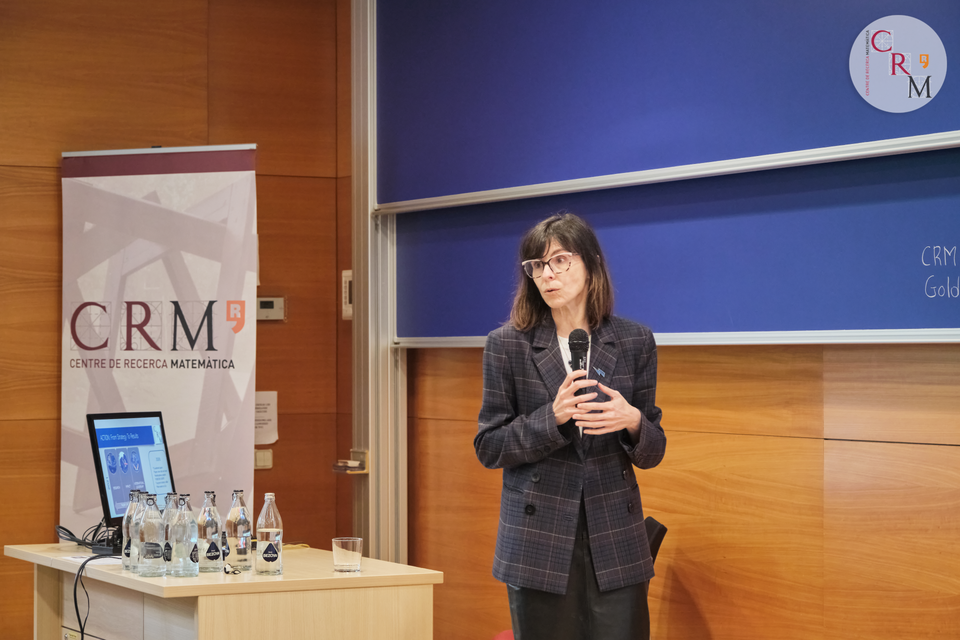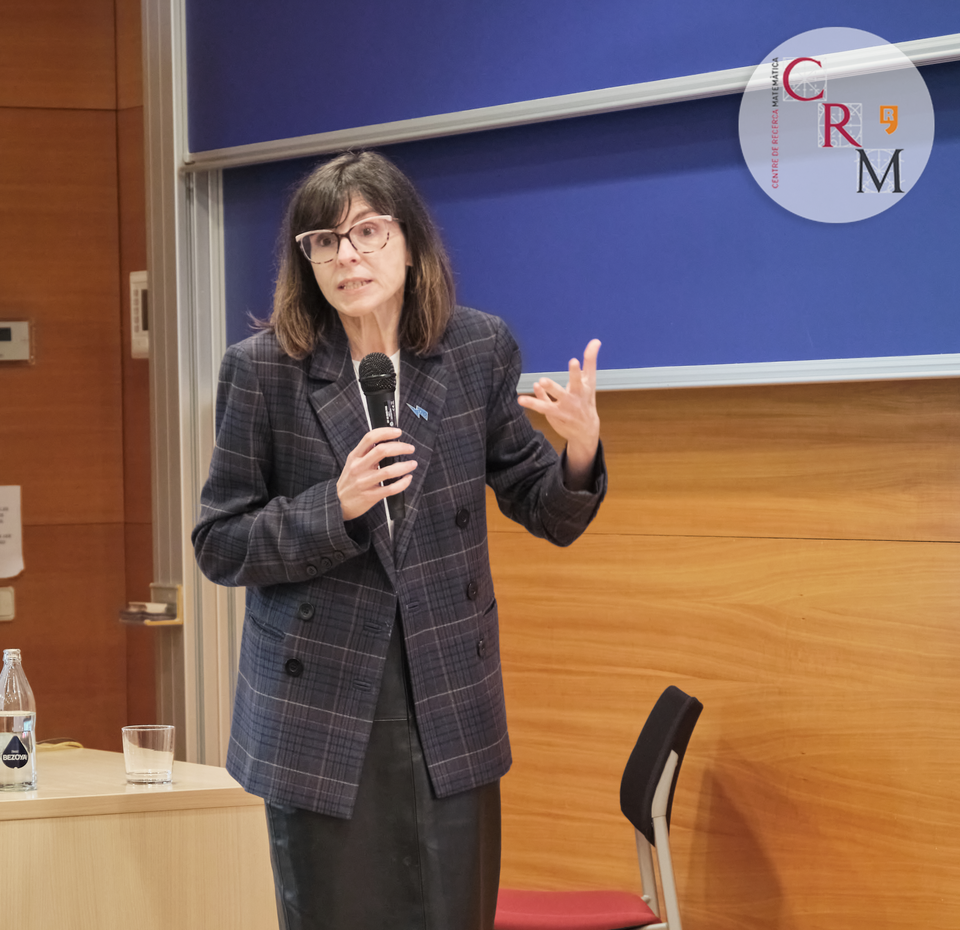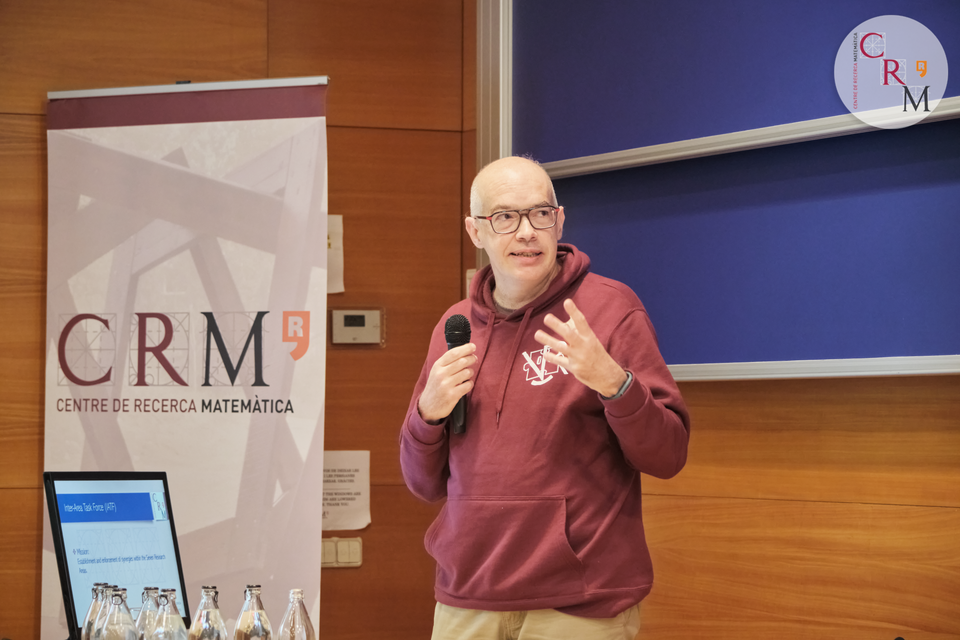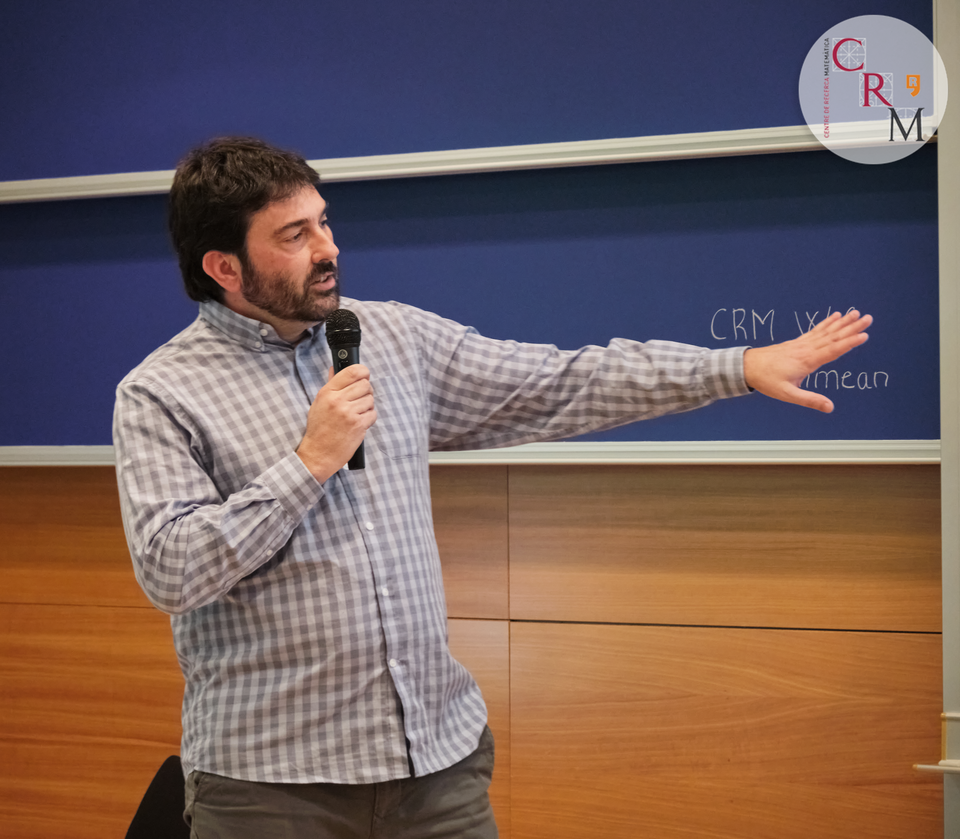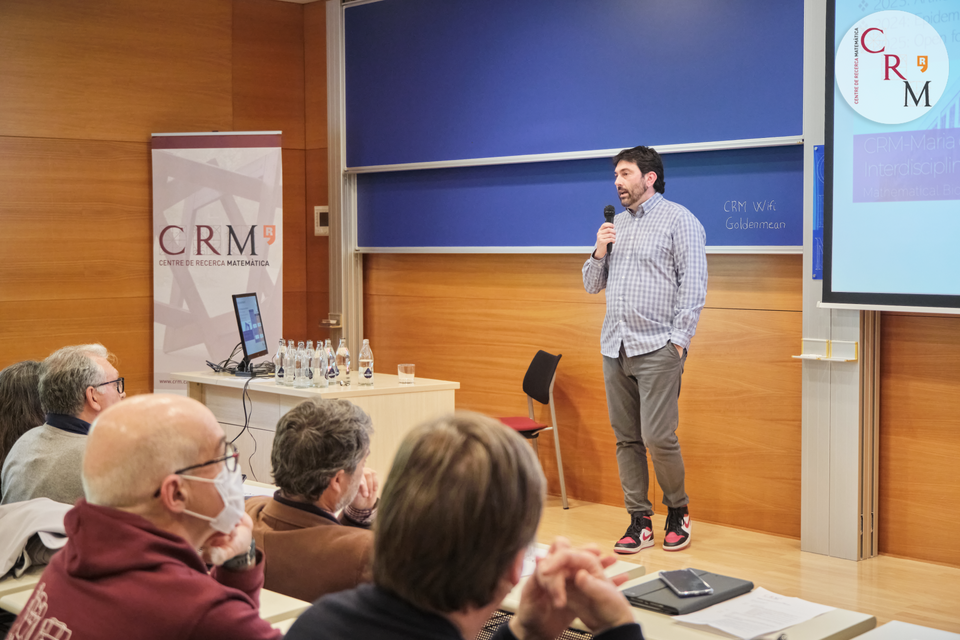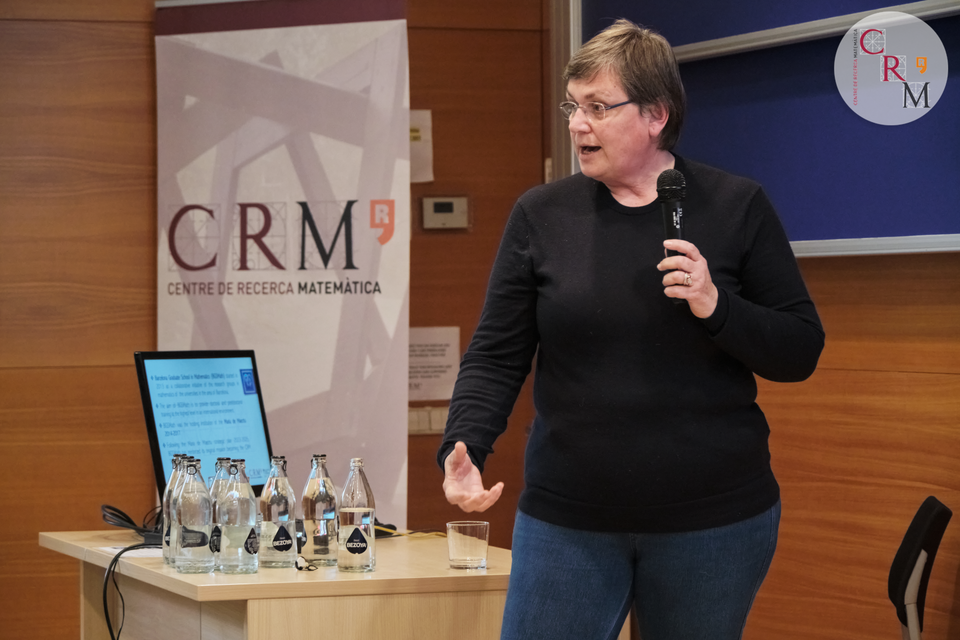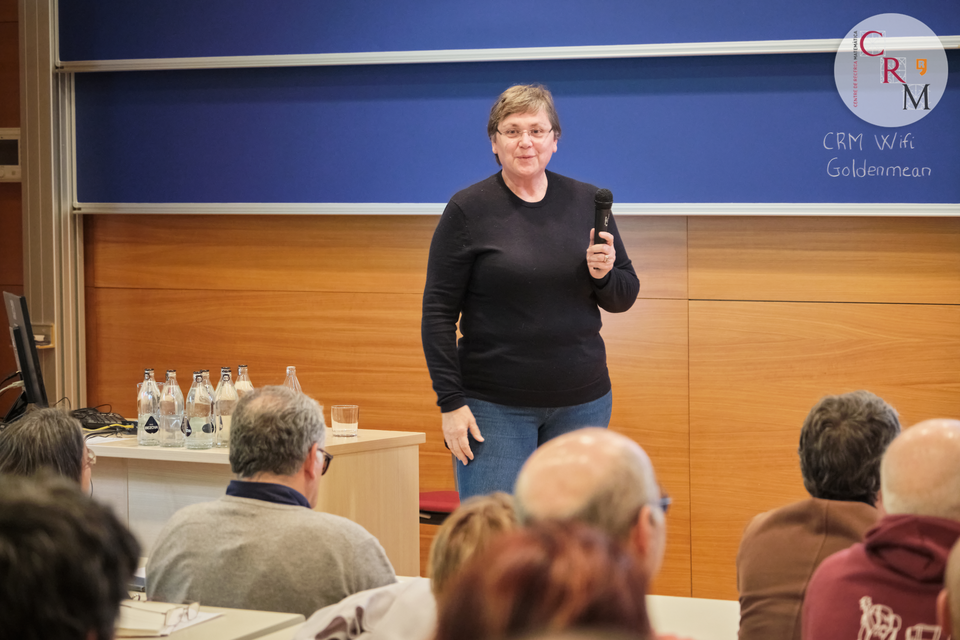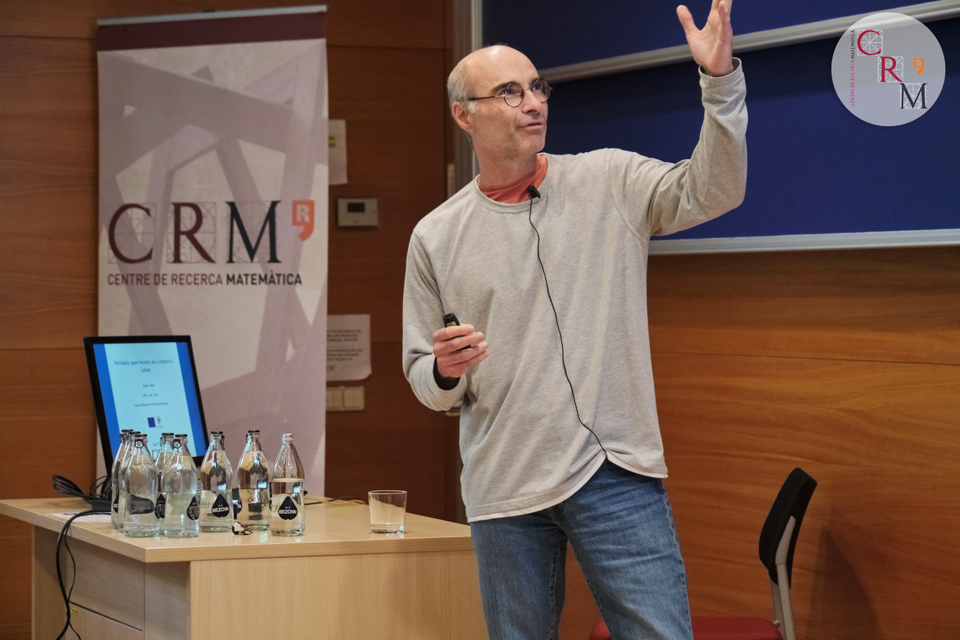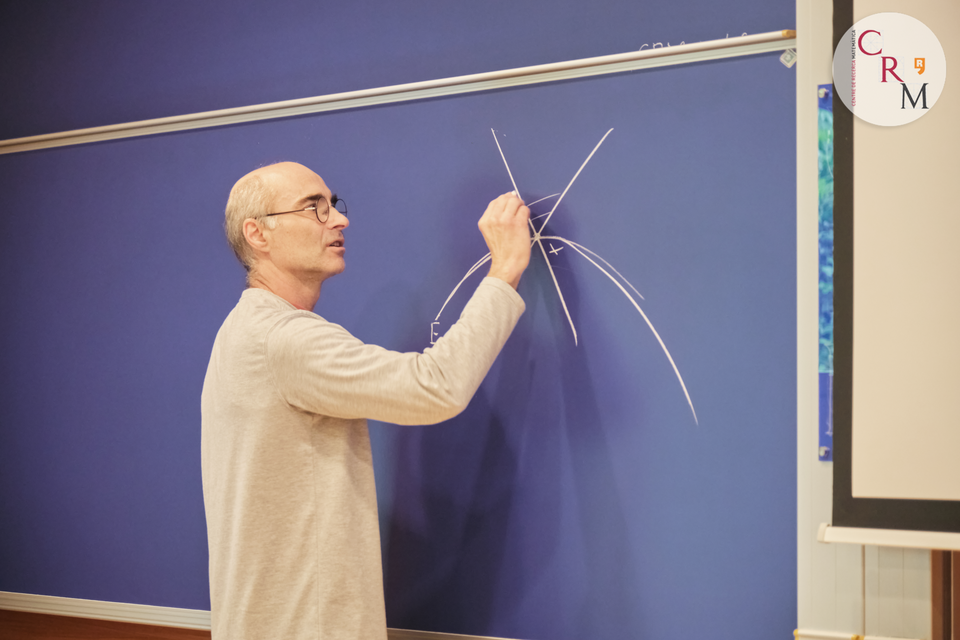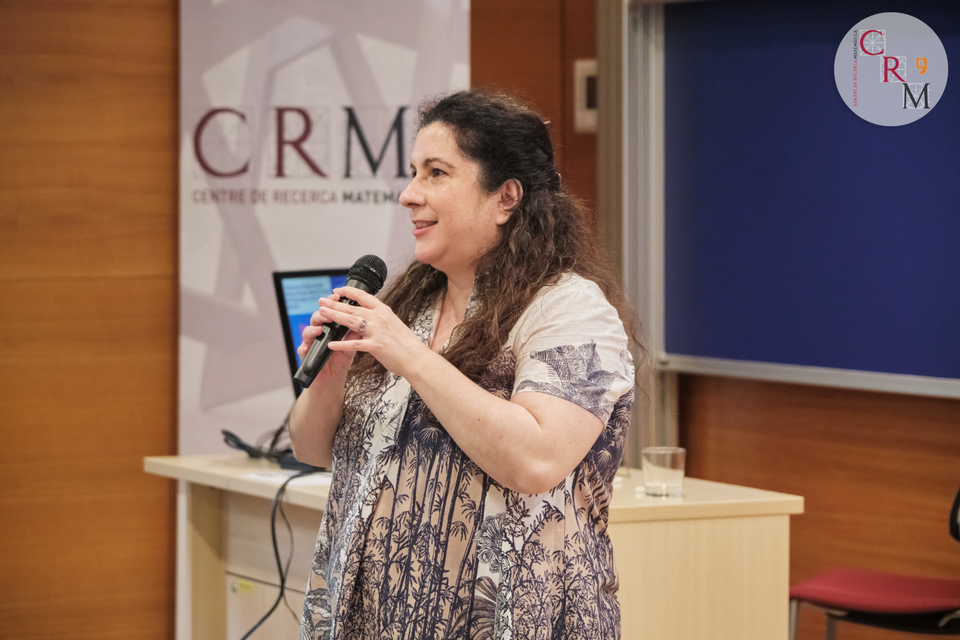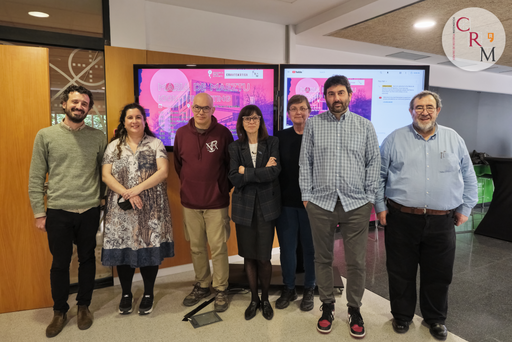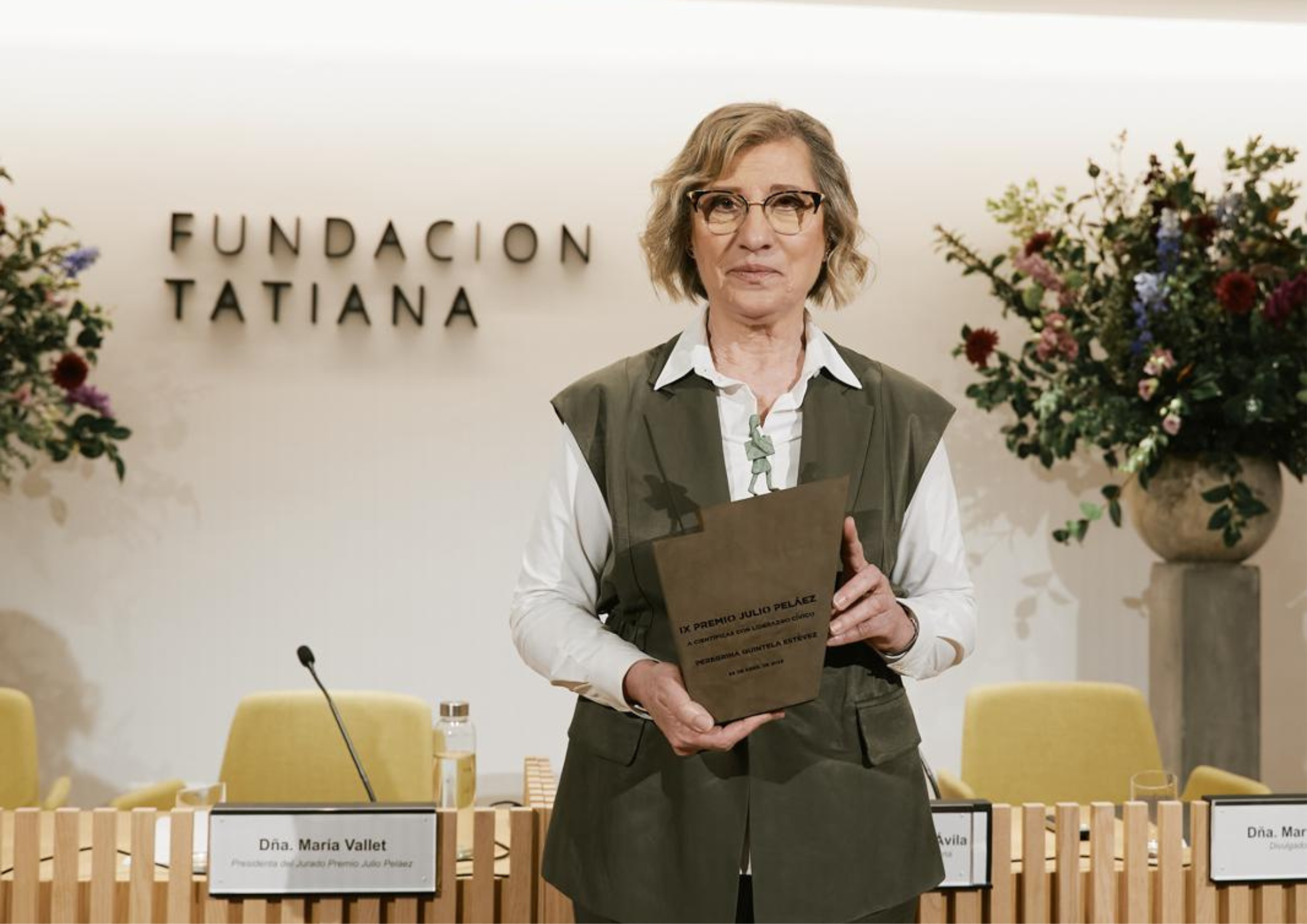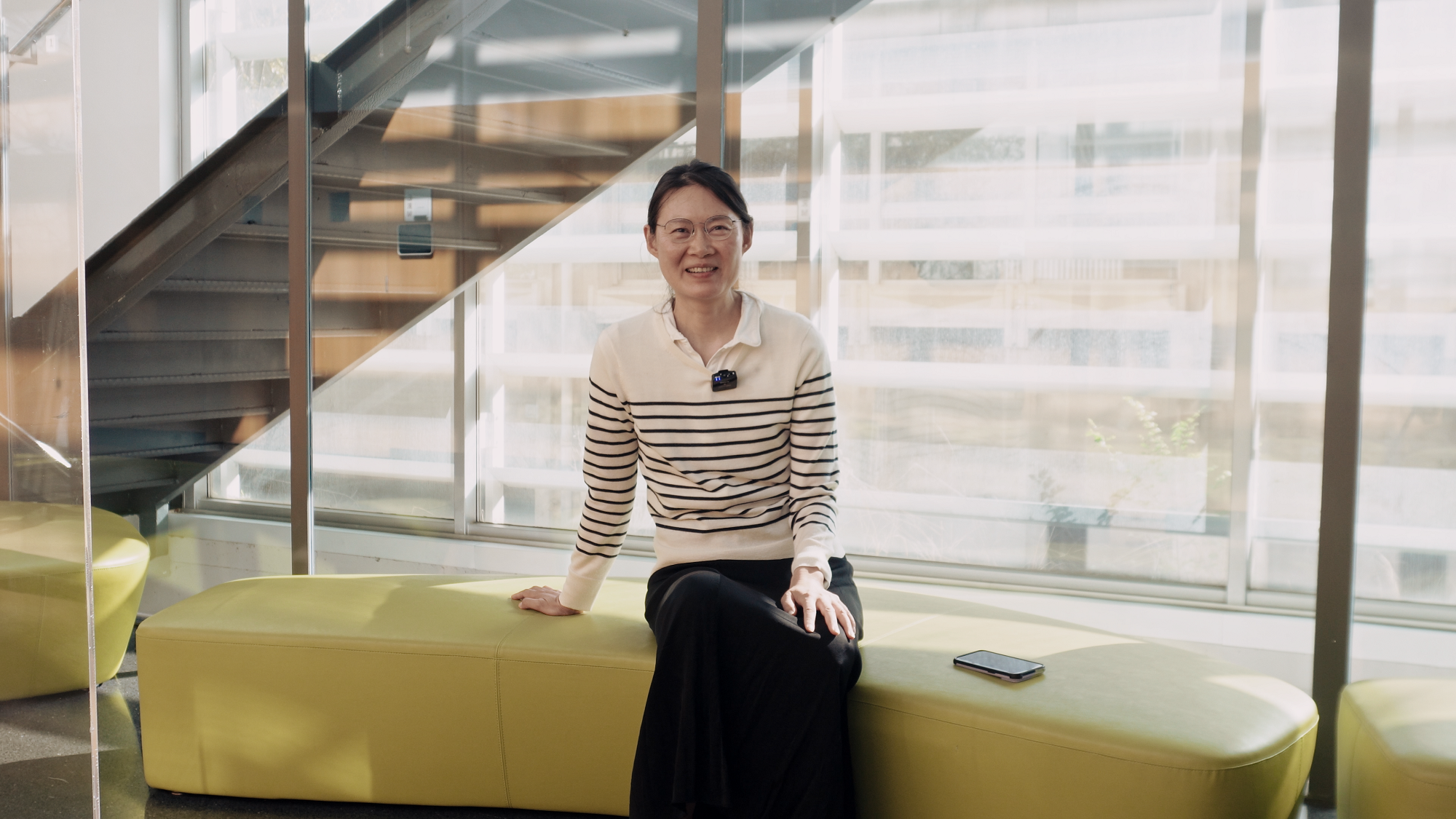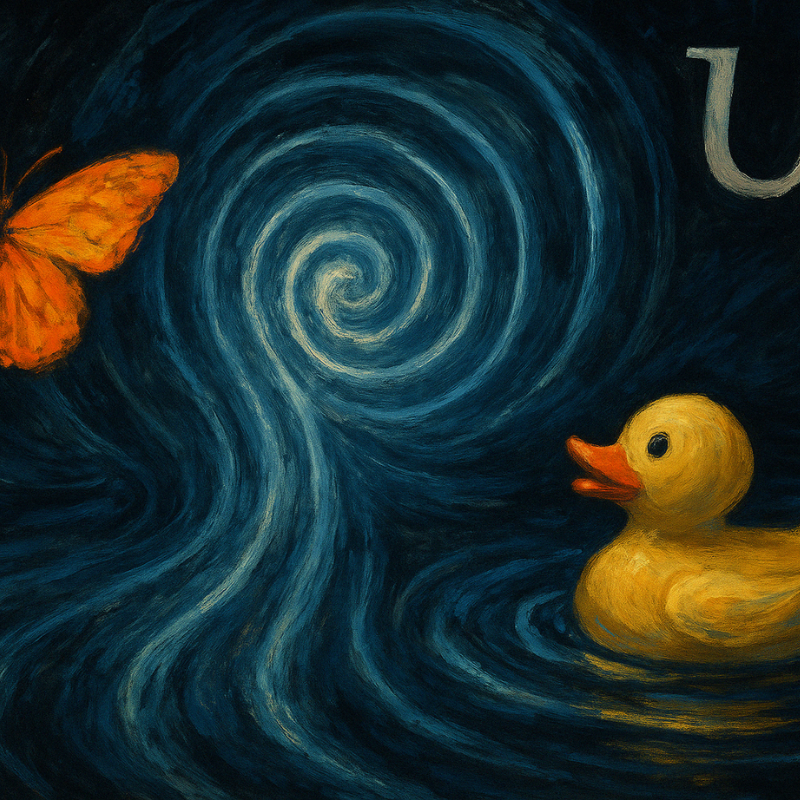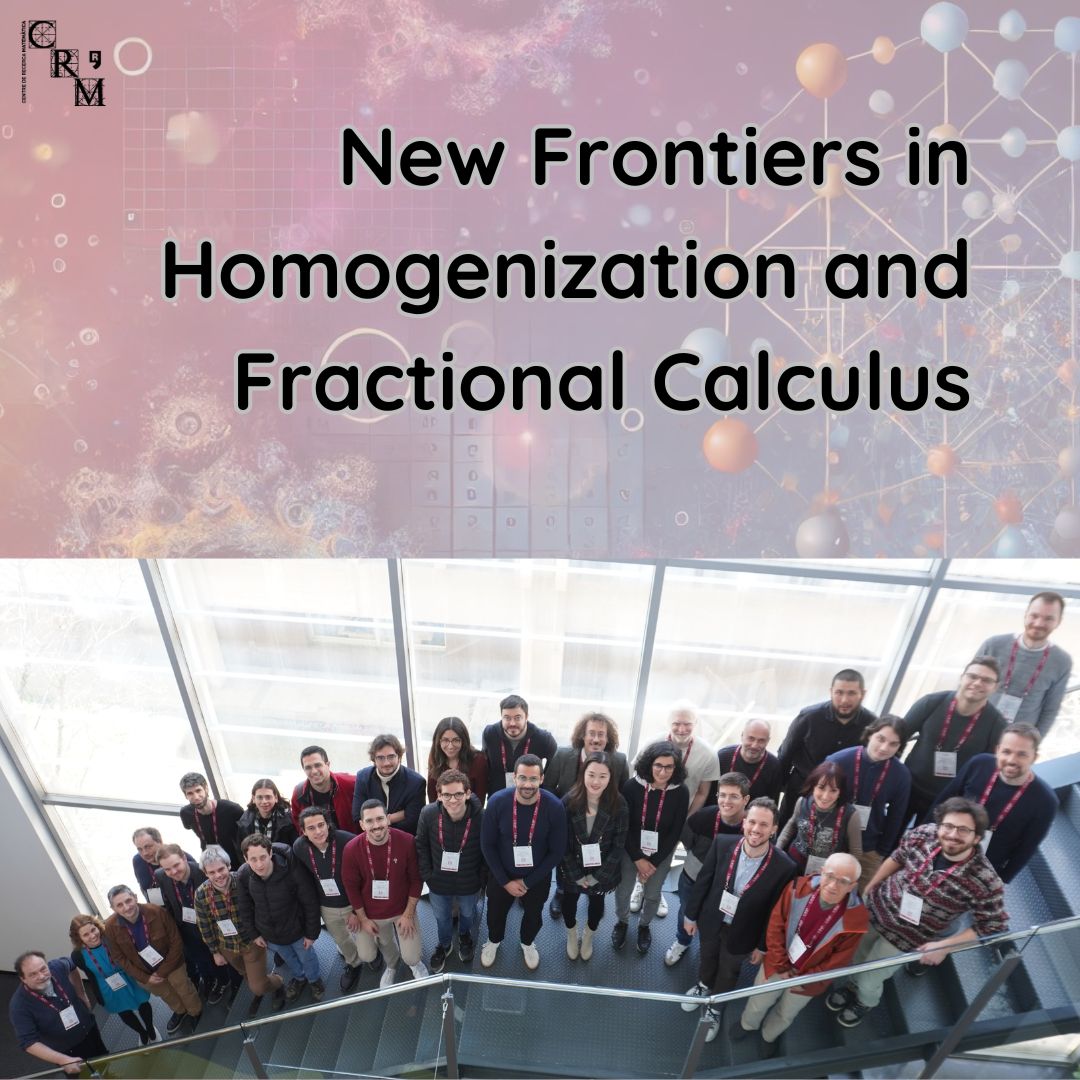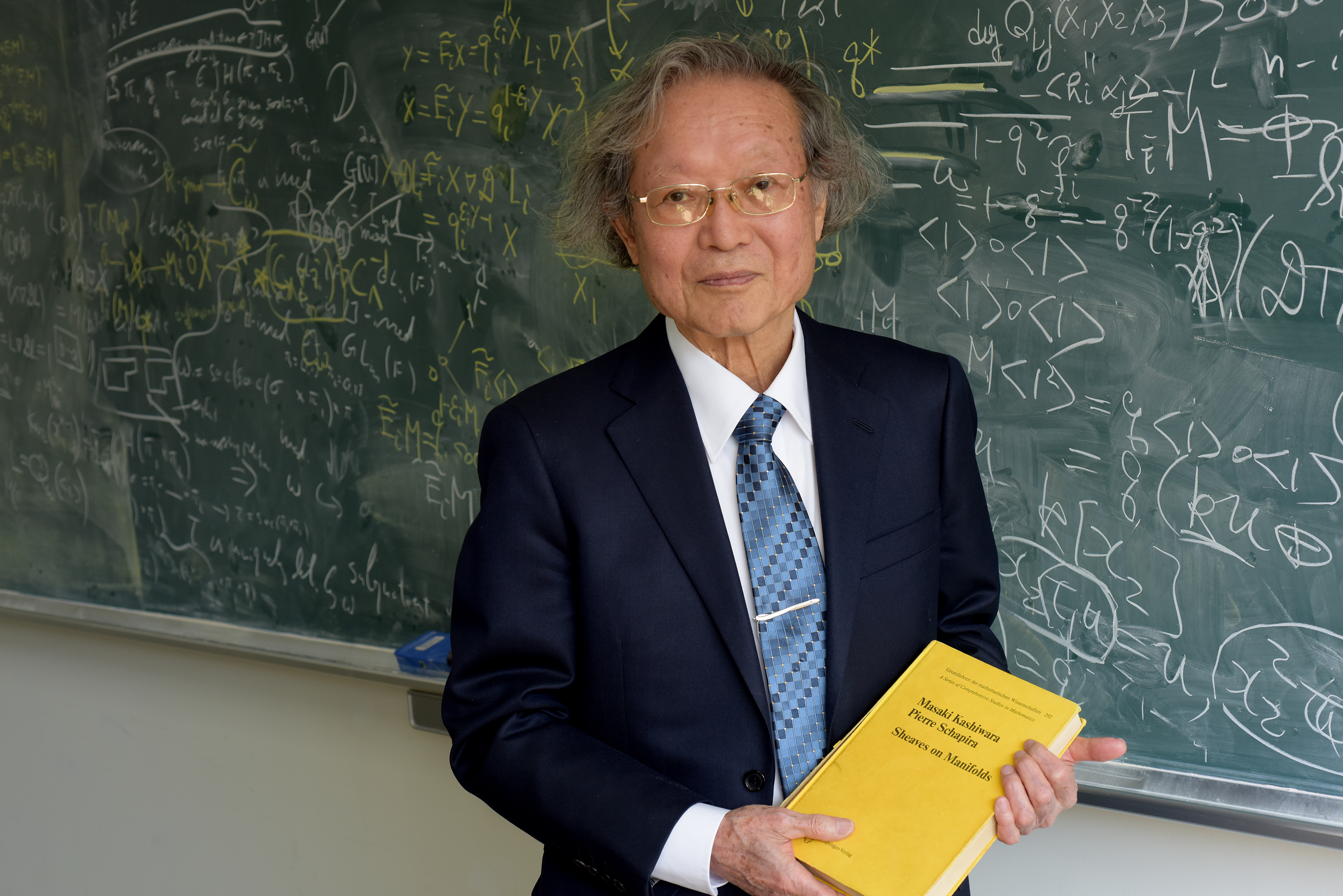Full Photo Gallery
Last Friday 22nd of April, the Maria de Maeztu Unit of Excellence Accreditation was presented on an open ceremony in the CRM. The CRM is one of the six Maria de Maeztu Units of Excellence awarded by the Spanish State Research Agency (AEI) on the 2020 Call.
The ‘Severo Ochoa’ and ‘Maria de Maeztu’ Excellence Centers and Units program aim to recognize public research organizations, in any scientific field, that stand out for the relevance and international impact of their research. Besides a recognition to the centre trajectory, the award is a proof of support to CRM’s Strategic Research Program on the next four years, aimed at consolidating the centre’s scientific capabilities and enhancing its ability to attract talent over the next four years. It is obtained after a rigorous evaluation process carried out by an international committee consisting of top scientists, in accordance with the most demanding standards.
The occasion brought together CRM’s researchers and a representative part of the Spanish and Catalan mathematical community. The program of the day included speeches by the attending authorities, two scientific colloquiums and the presentation of the Strategic Research Program by researchers involved in its deployment.
Welcome by authorities: greetings and glances into the future
Lluis Alsedà, director of the CRM, opened the event by welcoming the attendants, researchers, and authorities, in an energic speech that focused on the future. ‘Today is not a celebration day, it is a working day’, he declared. He outlined the centre’s characteristics and potential to become an Excellence Research Hub in Barcelona that builds a transversal path in mathematics improving mathematical research overall. ‘The Maria de Maeztu award is not an aim in itself; it is a means of achieving our long-term goals’ was his message to give start to the deployment of the CRM’s Strategic Research Plan.
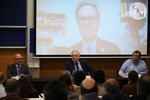 After that, Robert MacKay, from the University of Warwick and chairman of the CRM Scientific Advisory Board, also gave his warm congratulations to the centre. He highlighted Lluis’ purpose to ‘form interaction amongst CRM and different partners and deepening its role in national and international scenes’. He also mentioned how, from his recent participation on an appointment panel of postdoc positions funded by the MdM distinction, he looks forward to great things coming out of them and gives testimony of the value of the research conducted in the centre.
After that, Robert MacKay, from the University of Warwick and chairman of the CRM Scientific Advisory Board, also gave his warm congratulations to the centre. He highlighted Lluis’ purpose to ‘form interaction amongst CRM and different partners and deepening its role in national and international scenes’. He also mentioned how, from his recent participation on an appointment panel of postdoc positions funded by the MdM distinction, he looks forward to great things coming out of them and gives testimony of the value of the research conducted in the centre.
Next one to speak was Domènec Espriu, director of the State Research Agency (AEI). ‘Today is a great day for mathematics and a great day for science in Catalunya’ was the beginning of his speech. He also stressed the fact that 21 out of the 57 centres that have been given the Severo Ochoa and Maria de Maeztu awards are from Catalunya (and 10 out of those from the UAB Campus, as pointed out by the Universitat Autònoma de Barcelona rector). ‘This reflects the high competitivity of the research environment in which CRM moves’, he concluded. ‘The María de Maeztu and Severo Ochoa programs will continue and expand in the future, the competition is high and excellence has to have recognition’, he announced.
Javier Lafuente, rector of the Universitat Autònoma de Barcelona (UAB), also celebrated the accreditation. ‘The MdM award only goes to reinforce the scientific impact and international projection of the CRM’, he stated. He recognized the key actor that CRM was in the project that the UAB had in the 1980s to build a unique campus characterized by teaching but clearly tied to excellent research activity. He stressed how the campus is an ideal setting for the creation and transmission of knowledge and the capture of talent.
Gemma Geis, MH Minister of Research and Universities, in representation of the Catalan Government, was the last one to speak. She both congratulated and thanked the Centre de Recerca Matemàtica for its achievement and ‘for being part of the research ecosystem which is a source of pride and has an impact all over the world’.
The two high-level scientific colloquiums
Helen Byrne, professor of Applied Mathematics at the University of Oxford and member of the Scientific Advisory Board of the CRM was the first speaker. She was introduced by CRM’s IP Tomas Alarcon as the leader of a top-edge group in Mathematical Biology particularly to the topic of Angiogenesis (the process through which new blood vessels form from pre-existing ones) and a valuable member of the Scientific Committee of the centre for a long time. He also mentioned this collaboration as an example of the interdisciplinarity pursued by the CRM Strategic Research Plan.
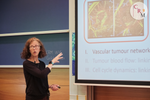 “Quantifying Form and Function in Vascular Tumours” was Helen Byrne’s talk about the study of many tumour regions which lack the proper levels of oxygen. If there is not enough oxygen being supplied to the cells, it can disrupt the cell cycle, alter responses to different therapies and enhance metastasis. Three different stages of the research that use different mathematical methodologies are shown to illustrate the breadth of mathematical applications to biology and how interdisciplinarity helps to the growth of both fields.
“Quantifying Form and Function in Vascular Tumours” was Helen Byrne’s talk about the study of many tumour regions which lack the proper levels of oxygen. If there is not enough oxygen being supplied to the cells, it can disrupt the cell cycle, alter responses to different therapies and enhance metastasis. Three different stages of the research that use different mathematical methodologies are shown to illustrate the breadth of mathematical applications to biology and how interdisciplinarity helps to the growth of both fields.
Xavier Tolsa, ICREA professor at the Universitat Autònoma de Barcelona and affiliated researcher at CRM gave the afternoon scientific talk. He was introduced by Universitat de Barcelona professor Joaquim Ortega as one of the most renowned Catalan mathematicians in the international community. In his doctoral studies he was proposed the 1960s’ unsolved Vitushkin problem on the semiadditivity of analytic capacity and this lead to the first of many awards, grants and distinctions that he has been receiving throughout his career.
“Rectifiability, square functions, and a conjecture of Carleson” was Xavier Tolsa’s talk in the field of the geometric theory of measure. In it, he talked about Carleson’s ε2-conjecture. He explained the history and work behind the conjecture and proof of one of its implications (Bishop, 1987). Finally, he illustrated his contribution to proving the other implication (Jaye, Tolsa, Villa, 2021).
The four years to come: from strategy to action
The afternoon session started with the presentation of the Strategic Research Program through 5 different talks. Marcel Guàrdia (UPC-CRM), MdM’s Scientific Director, started by giving a general view of the project and outlining the main SRP objectives. Arantxa Sanz, Executive Director of the CRM, developed into more detail the goals to bring them into action. Joan Porti (UAB-CRM) and Josep Sardanyés (CRM) presented the Inter-area Task Force and the Interdisciplinary Task Force respectively, two key elements to work with the focus on the strategic objectives. Finally, Carme Cascante (UB-CRM) presented the BGSMath Training Unit of which she is the director. The objectives and plans and tools to bring them in to action can be summarized as follows:
The first objective is to build a cohesive research group with a very wide scope in mathematical research, from theoretical to applied mathematics and to promote interdisciplinary research at internal level but also with other research centres. This objective includes the formation of two new research lines: Mathematical foundations of Artificial Intelligence and Climate/Environmental impact in Public Health. To make sure that these intentions lead to more collaborations an Inter-area Task Force (IATF) and Interdisciplinary Task Force (IDTF) have been appointed.
The Inter-area Task Force (IATF) is born with the mission of establishing and enforcing synergies within the Seven Research Areas, counterbalancing the specialization in research, and finding connections between very different fields of study. For that purpose, inter-area workshops will be organized as well as Fellowships and Master Thesis offered for Interdisciplinary topics.
The Interdisciplinary Task Force (IDTF) has been created to take advantage of the growth of topics covered in the CRM to seek more collaborations with research centres (not just mathematical ones) and universities. Also, the IDTF will promote interactions between CRM researchers and students.
With the previous aspects in mind, the second objective of the centre is to create a breeding ground for young mathematical talent. It involves recruiting young researchers (8 PhD students, 15 postdoctoral fellows and 2 junior leaders) but also training and mentoring them through the process. Therefore, the BGSMath is a key actor in the strategic plan development. Its catalogue of graduate courses, joint Junior Meetings, Colloquiums and Junior Seminars will be expanded. For example, this summer a Barcelona Introduction to Mathematical Research Summer School will be organized, and the two first editions of another school, ‘Hypatia’, with a gender-friendly perspective
The third objective is the exchange with Industry, Government and Society to achieve impact beyond academia. The Knowledge Transfer Unit of the centre will be a key actor to establishing long time industrial collaborations, organizing institutional workshops, and intensifying co-creation with users.
The fourth objective is boosting the leadership of Catalan mathematics in the international arena, for example, generating collaborative research projects with other institutions. The Interdisciplinary Task Force will play a key role in this objective too. The co-organization with other ERCOM centres of CRM’s activities (IRPs, workshops) will be encouraged.
Throughout the project, track of the progress will be kept through semestral meetings and selection processes and activities will take place in a diversity and equality framework.
The closing speech was given by Eva Miranda, UPC-CRM researcher and co-director of the MdM project. ‘The CRM is in a very interesting moment’, she stated. She stressed out the opportunity of having so many researchers working together that will reinforce both the universities and the CRM. ‘Mathematics is not just our work; it is our passion. What’s great about this new project is that now we can do it together, and we can do it better’, she asserted. By citing 2019 Abel’s Prize, Karen Uhler and 2016 Presidential Medal of Freedom, Margaret H. Hamilton, Eva Miranda closed her talk which focused on the new horizon opened by the Maria de Maeztu, acknowledging the hard work and challenges ahead but facing them with strength and great hopes.

CRM Comm Team
Anna Drou | Paula Lomascolo | Pau Varela
Peregrina Quintela reconeguda amb el Premi Julio Peláez 2025
La Dra. Peregrina Quintela Estévez, membre del Comitè Científic Assessor del Centre de Recerca Matemàtica (CRM) des del 2017, ha estat distingida amb el Premi Julio Peláez 2025 a Científiques amb Lideratge Cívic. El guardó reconeix la seva trajectòria en matemàtiques...
Chenchang Zhu, Inaugural CRM–María de Maeztu Chair of Excellence
The Centre de Recerca Matemàtica (CRM) has named Professor Chenchang Zhu (University of Göttingen) as the first María de Maeztu Chair of Excellence, a position that recognises leading women mathematicians. Her appointment began on April 9, 2025, with a lecture on...
Eva Miranda Featured in Quanta Magazine
Eva Miranda, professor at the UPC and researcher at the CRM, is featured in Quanta Magazine. The article highlights how certain physical systems, such as fluid flows, can simulate computations so complex that predicting their behaviour becomes mathematically...
Exploring New Frontiers: Chronicle of the School on Homogenization and Fractional Calculus
On 24-25 March 2025, the Centre de Recerca Matemàtica (CRM) hosted the ‘School on New Frontiers in Homogenization and Fractional Calculus’ to celebrate the 50th anniversary of Γ-convergence. This mathematical technique was introduced by Ennio De Giorgi and Tullio...
Quillen i la Quimera de l’Homotopia Equivariant: Estratificant l’Inimaginable!
L'equip de l'estudi ha ampliat el teorema de Quillen per treballar amb espectres anellats equivariantment com a coeficients. També ha formulat una estratificació geomètrica en el llenguatge de la geometria tensorial-triangular equivariant. Els investigadors es van...
Masaki Kashiwara rep el Premi Abel 2025 per les seves aportacions a l’anàlisi algebraica
El matemàtic japonès Masaki Kashiwara ha estat guardonat amb el Premi Abel 2025. Entre les seves fites destaca el desenvolupament pioner de la teoria dels D-mòduls, que ha tingut una influència profunda en les matemàtiques modernes i en camps com la física teòrica....

